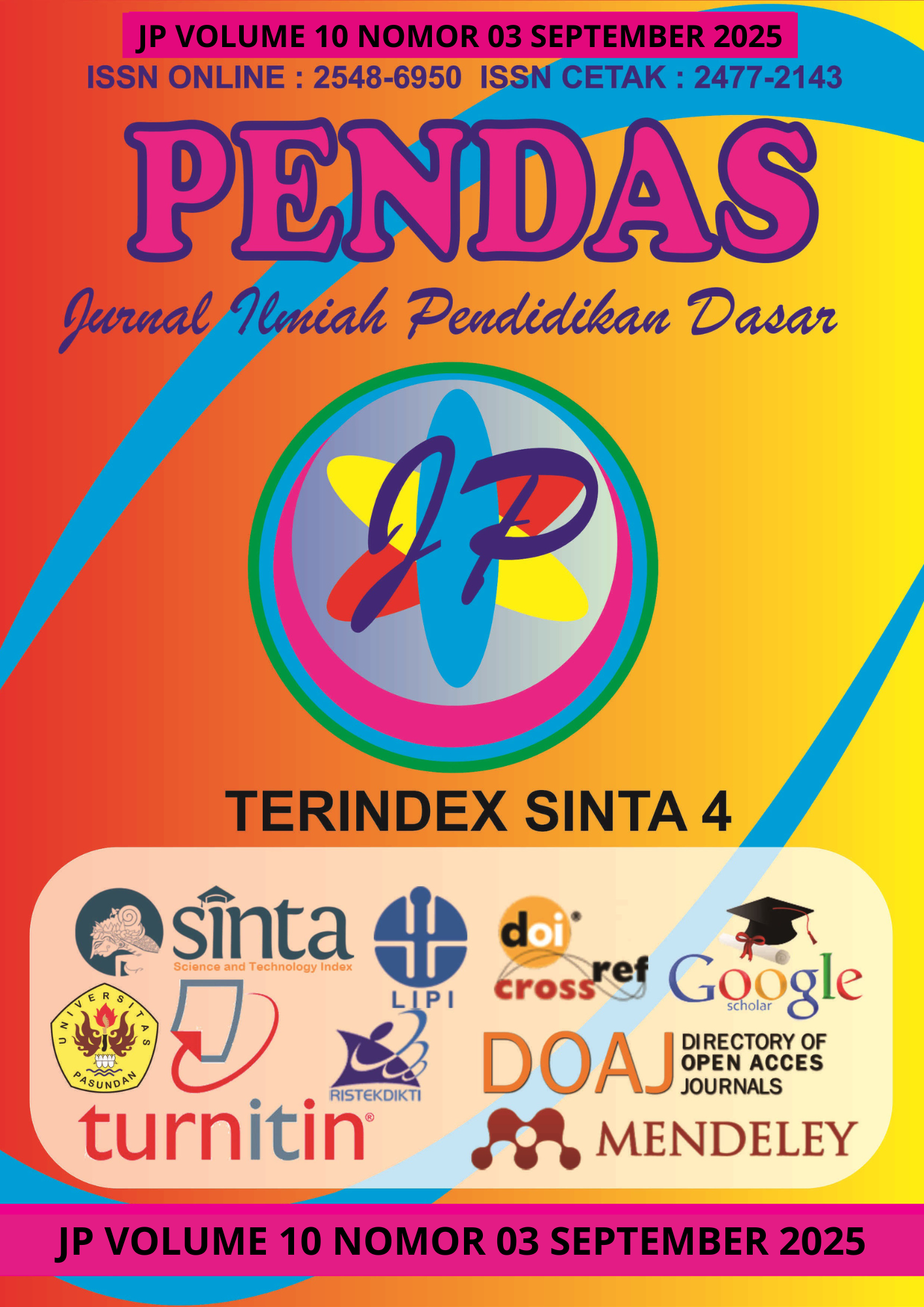EFEKTIVITAS PENGGUNAAN FLASHCARD BERBASIS AUGMENTED REALITY MATERI EKOSISTEM TERHADAP LITERASI SAINS KELAS 5 SDN BENDO 01 PONGGOK BLITAR
DOI:
https://doi.org/10.23969/jp.v10i3.29745Keywords:
augmented reality, flashcard, science literacyAbstract
The purpose of this study was to determine the effectiveness of augmented reality-based flashcard media on ecosystem material. And to determine the increase in science literacy of grade 5 students of SDN Bendo 01 Ponggok Blitar. This study used an experimental method in the form of a quasi-experimental design. The population in this study were 40 grade 5 students of SDN Bendo 01 Ponggok Blitar with the number of students in class 5A 20 students and class 5B 20 students. Data collection techniques in this study used tests and documentation. The results of the normality test of the experimental class in this study were 0.016> 0.05 in the pretest data and the significant value of the posttest was 0.092> 0.05 normally distributed. The results of the homogeneity test can be seen that the significant value of the posttest data is 0.100, this indicates that the value of the significant 0.100> 0.05 so that the posttest data criteria accept H0 which means that both classes have homogeneous variance. The results of the independent sample t-test on the posttest data of the experimental class and the control class can be seen that the sig. (Two-Sided p) value is 0.002 <0.05. The results of the paired sample t-test on the pretest and posttest data using SPSS 30.0 can be seen that the sig. (Two Side p) value is 0.001 <0.05, so there is a significant difference between the pretest and posttest. The improvement of the science literacy skills of grade 5 students of SDN Bendo 01 Ponggok Blitar was obtained from the pretest and posttest assessments.
Downloads
References
Alfitriani, N. M. (2021). Penggunaan Media Augmented Reality dalam Pembelajaran mengenal Bentuk Bumi. Jurnal Penelitian Pendidikan, 30-38.
Ana Sari, P., Fatih, M., & Alfi, C. (2024). Booklet Berbasis Augmented Reality Melalui Pembelajaran Pbl Materi Keseimbangan Ekosistem Untuk Meningkatkan Literasi Sains Kelas V Sdn Sumberingin 04 Blitar. MODELING: Jurnal Program Studi PGMI, 11(2), 380–393.
Ernis, P., & Hazmi, N. (2021). Kata kunci : Hasil Belajar, Media Puzzle , Komponen Ekosistem. Journal of Elemantary School (JOES) Volume, 4, 45–56.
Hanafy, M. S. (2021). Konsep Belajar dan Pembelajaran. Lentera Pendidikan : Jurnal Ilmu Tarbiyah dan Keguruan, 1, 66-79.
Haryadi, R., & Al Kansa, H. N. (2021). Pengaruh media pembelajaran E-Learning terhadap hasil belajar peserta didik. Jurnal Pendidikan 7, 68.
Isnaeni, N., & Sa, C. (n.d.). Mengoptimalkan Kemampuan Literasi Sains dengan Earth Exploration : E-Modul Berbasis Augmented Reality Berbantuan Assemblr EDU. 521–530.
Izatunnisa, d. (2019). Pengembangan LKPD Berbasis Pembelajaran Penemuan Untuk Meningkatkan Kemampuan Literasi Sains Peserta Didik pada materi Kimia SMA. Jurnal Pijar Mipa, 14(2), 46.
Liana, D., & Susanti, E. (2024). Penerapan Augmented Reality untuk Meningkatkan Literasi Sains Siswa Kelas 5 Madrasah Ibtidaiyah. XXI(2), 36–43.
Marits , A. (2021). Pengaruh Teknologi dalam dunia pendidikan. Al-Mutharahah : Jurnal Penelitian dan Kajian Sosial Keagamaan(2), 92.
Putri, M., Rizki, I. N., & Marlina, L. (2024). Development of Flashcard Media Based on Augmented Reality on Dynamic Fluid Material to Train Critical Thinking Skills of High School Students. 10(12), 10269–10277. https://doi.org/10.29303/jppipa.v10i12.9778
Rahman, M. A., Faisal, R. R., & Tho, C. (2023). The Effectiveness of Augmented Reality Using Flash Card in Education to Learn Simple English Words as a Secondary Language. Procedia Computer Science, 227, 753–761. https://doi.org/10.1016/j.procs.2023.10.580
Tri Wulandari, & Adam Mudinillah. (2022). Efektivitas Penggunaan Aplikasi CANVA sebagai Media Pembelajaran IPA MI/SD. Jurnal Riset Madrasah Ibtidaiyah (JURMIA), 2(1), 102–118. https://doi.org/10.32665/jurmia.v2i1.245
Yulia, N. M., Darul, D., & Putri, L. (2024). Pengembangan Media Intraktif Assemblr EDU Berbasis Augmented Reality dalam Meningkatkan Literasi Sains. Jurnal Pendidikan Dasar Flobamorata, 5(3), 410–419.
Yusup, A, H., Azizah, A., Reejeki, Endang, S., & Meliza, S. (2023). Literature Review: Peran Media Pembelajaran Berbasis Augmented Reality Dalam Media Sosial. JPI: Jurnal Pendidikan Indonesia, 2(5), 1–13. https://doi.org/10.59818/jpi.v3i5.575
Downloads
Published
Issue
Section
License
Copyright (c) 2025 Pendas : Jurnal Ilmiah Pendidikan Dasar

This work is licensed under a Creative Commons Attribution 4.0 International License.



















